References in the Re-imagined Series: Difference between revisions
From the only original and legitimate Battlestar Wiki: the free-as-in-beer, non-corporate, open-content encyclopedia, analytical reference, and episode guide on all things Battlestar Galactica. Accept neither subpar substitutes nor subpar clones.
More actions
No edit summary |
Helmandsare (talk | contribs) No edit summary |
||
| Line 46: | Line 46: | ||
===[[33]]=== | ===[[33]]=== | ||
*(Also seen elsewhere in the series) The format of the opening titles, a series of clips representing the story of the [[Fall of the Twelve Colonies|Cylon attack on the twelve colonies]] and the exodus of the fleet (all taken from the [[Miniseries]]), followed by clips from the upcoming episode, is a homage to the television series ''[[w:Space 1999|Space 1999]]'', which [[Ronald D. Moore]] admits to having watched while growing up. | *(Also seen elsewhere in the series) The format of the opening titles, a series of clips representing the story of the [[Fall of the Twelve Colonies|Cylon attack on the twelve colonies]] and the exodus of the fleet (all taken from the [[Miniseries]]), followed by clips from the upcoming episode, is a homage to the television series ''[[w:Space 1999|Space 1999]]'', which [[Ronald D. Moore]] admits to having watched while growing up. | ||
* (Also seen elsewhere in the series) The photograph pilots touch on entering / leaving the Ready Room is called [["Lest We Forget"]] and shows a Colonial soldier falling to his knees on witnessing the destruction of the capital of [[ | * (Also seen elsewhere in the series) The photograph pilots touch on entering / leaving the Ready Room is called [["Lest We Forget"]] and shows a Colonial soldier falling to his knees on witnessing the destruction of the capital of [[Aerilon]] during the [[Cylon War]]. This is a direct homage to the pictures of NYFD personnel at Ground Zero on 9/11, while the title is drawn from the John Ford-directed film "[[w:She Wore a Yellow Ribbon|She Wore a Yellow Ribbon]]" starring John Wayne. | ||
* The ''[[Rising Star (RDM)|Rising Star]]'' mentioned as the birthplace of the Fleet's first baby is a reference to the luxury liner ''[[Rising Star (TOS)|Rising Star]]'' from the Original Series | * The ''[[Rising Star (RDM)|Rising Star]]'' mentioned as the birthplace of the Fleet's first baby is a reference to the luxury liner ''[[Rising Star (TOS)|Rising Star]]'' from the Original Series | ||
Revision as of 05:54, 21 March 2010
| Part of the series on | |
|
References in |
|
|
References to |
|
References to the original Battlestar Galactica series
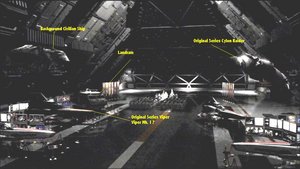
- The Cylon design the Armistice Officer is looking at in the beginning, and the Cylon Centurion in the Galactica's museum, are from the original show.
- Original Series vehicles seen in the Galactica Museum:
- A model of the original Cylon basestar.
- A mock-up, or possibly a servicable Original Series shuttle. Another of these shuttles is used by the Armistice Officer when docking at Armistice Station.
- A full-scale mock-up of an Original Series Cylon Raider. It is hanging from the ceiling for the flight pod.
- The Original Series Viper.
- A landram vehicle.
- The theme played during the current affairs program used to introduce Dr. Gaius Baltar is that of the Original Series fanfare. The fanfare is again heard during the decommissioning Viper flyby. It is the Twelve Colonies' national anthem.
- Baltar tells Number Six that "the last time anyone saw a Cylon [i.e., the Original Series], they looked like walking chrome toasters."
- Baltar tells Number Six that "The punishment for treason is death". In the Original Series, a point is made of the death penalty being abolished, even for treason.
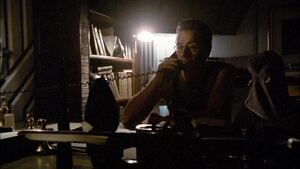
- A sword carried by the Centurions in the original series is one of the weapons in Commander Adama's collection. It is possible the sword could be a war trophy picked up by Adama when the Galactica is boarded by the Cylons at the end of the war ("Valley of Darkness", deleted scene).
- In the first encounter between the Colonial Vipers and the Cylon Raiders, one of the pilots says that during the first war, Raiders looked like flying wings (the original series' Raider design).
- One of Galactica's pilots who is killed by the Cylons is called Jolly, the name of a Galactica pilot from the Original Series.
- Roslin makes a point of calling Lee "Captain Apollo", saying "it has a nice ring to it."
- At the end of the Miniseries, Sharon Valerii says "by your command," the standard response of the Original Series' Cylons to the Imperious Leader.
- The venting of the flightpod after the nuclear missile hit is similar to the plot of the Original Series episode "Fire in Space".
Other References
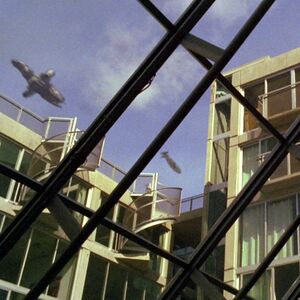
References not specific to the Miniseries
- Number Six's name is a reference to the character of the same name from The Prisoner.
- Colonel Saul Tigh is based on Kirk Douglas's alcoholic XO character in In Harm's Way, whose wife cheats on him.
- Colonial One's design was based on Air Force One, and the Raptor's design was based on the Apache attack helicopter.
- The Gemenon liner's ID number is "1701;" in the Star Trek franchise, (which had many The Next Generation episodes written by Ron D. Moore), several models of USS Enterprises have registry numbers beginning with "NCC-1701."
- The Vipers' tail numberings are in the formats "N7424C" or "NC7424" or "7424NC". The consistent usage of the letters "NC" may also be a reference to Star Trek (see 1701 above). However it should be noted, that according to old (pre-1950s) American aircraft registration standards, all tail numbers start with "N" and "C" stands for the category "standard"; the Star Trek usage itself is based on that.
- The gun used by Helo, Boomer, and other pilots is a homage to the guns used in the movie Blade Runner (which also starred Edward James Olmos).
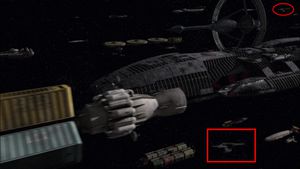
- According to a podcast, there is one prop, "smaller than a breadbox", which has appeared in almost every major space-related science fiction show in the past two decades, including the various Star Trek spinoffs, which also appears in Battlestar Galactica. This prop has yet to be positively identified, but it is highly likely that the prop itself is the "Oscillation Overthruster" from The Adventures of Buckaroo Banzai Across the Eighth Dimension, as this prop is known to have appeared in Star Trek: The Next Generation, Star Trek: Deep Space Nine, Star Trek: Voyager, and Star Trek: Enterprise.
References limited to the Miniseries
- Serenity, the ship from the show Firefly, can be seen through the window above Roslin's head at the opening to the scene she learns of her cancer diagnosis. Firefly and Battlestar Galactica shared the same special-effects studio, Zoic.
- Colonel Tigh burning the eye out of a picture of his wife is a reference to a similar scene in Apocalypse Now by Martin Sheen's character.
- Roslin's swearing-in as President was modeled to be identical to the famous photograph of Lyndon B. Johnson being sworn in as U.S. President aboard Air Force One after John F. Kennedy's assassination.
- The original USS Enterprise makes a cameo appearances in the shot of the Fleet immediately before the memorial service as well as the opening credits.
- (Also seen elsewhere in the series) The format of the opening titles, a series of clips representing the story of the Cylon attack on the twelve colonies and the exodus of the fleet (all taken from the Miniseries), followed by clips from the upcoming episode, is a homage to the television series Space 1999, which Ronald D. Moore admits to having watched while growing up.
- (Also seen elsewhere in the series) The photograph pilots touch on entering / leaving the Ready Room is called "Lest We Forget" and shows a Colonial soldier falling to his knees on witnessing the destruction of the capital of Aerilon during the Cylon War. This is a direct homage to the pictures of NYFD personnel at Ground Zero on 9/11, while the title is drawn from the John Ford-directed film "She Wore a Yellow Ribbon" starring John Wayne.
- The Rising Star mentioned as the birthplace of the Fleet's first baby is a reference to the luxury liner Rising Star from the Original Series
- Tom Zarek is played by Richard Hatch, famous for his role as Apollo in the Original Series.
- The title is a reference to the event that began the French Revolution, when a crowd of around 1,000 stormed the Bastille prison in Paris. In this case, the prison is a prison ship, and the prisoners themselves take it over.
- The Astral Queen's design is identical to the Prison Barge from the Original Series.
- The "I'm a bus driver, not a warden," comment from the Astral Queen's captain is a reference to Dr. McCoy's quips from the original Star Trek series.
- The scene where Lee Adama holds his pistol to a kneeling Tom Zarek is a recreation of Dirty Harry, according to David Eick's comments in the DVD commentary. "That is the 'I know what you're thinking, punk' shot, down to the move, the lens, the distance of the camera away from the actor."
- Ron Moore states on the DVD commentary, that the munition activation that kills several pilots was inspired by a similar event on the USS Forrestal in 1967.
- Also according to the DVD commentary, the ejection sequence at the beginning of each chapter is an homage to The Right Stuff.
- This episode shares some similarity - although possibly unintentional - with the final Galactica 1980 episode, "The Return of Starbuck", where Starbuck is stranded on a desert moon, and uses a crashed Cylon Raider to return to Galactica.
- The messy, organic feel of inside the Cylon Raider was inspired by the Alien series, according to David Eick during the DVD commentary.
- The "waggling" scene with Apollo's Viper and Starbuck's Raider is a nod to the Original Series. Apollo and Starbuck had to "waggle" their own Cylon Raider in order to convey they were friendlies, after losing their transmitter in "The Hand of God".
- The name of the episode refers to a litmus test, used in chemistry to determine the presence of an acid. The term is also used in politics, where it means to determine a candidate's stance on one or more crucial issues.
- Number Six says, "Don't make me angry, Gaius. You wouldn't like me when I'm angry." This is a possible reference to the famous catchphrase of Dr. Bruce Banner, just before turning into the Incredible Hulk: "You're making me angry, and you're not going to like me when I'm angry."
- The name of the episode is a reference to the combined movie of the same name, and share a similar concept - that everyone can be connected to others (in this case, Baltar, the dead scientist, and Shelly Godfry).
- As Boomer touches the captured Raider, she hums The spring pool on the mountain, a Korean children's song.
- The episode was initially going to be a riff on the movie Crimson Tide, where both Adama and Tigh would begin to suspect one another of being a humanoid Cylon, ending up in a scene where they would be pointing weapons at one another.
- The episode's name comes from the Stereophonics' song "Tie Me Up, Tie Me Down". Its also the name of a Spanish language movie staring Antonio Banderas. The film, incidentally, was one of first NC-17-rated movies in America.
- The final episode of the Original Series is also called "The Hand of God" and in both episodes Adama launches the first offensive strike against Cylon bases. However, according to the Official Companion neither the title, nor the plot are deliberate references and the writers didn't become aware of the parallels until much later after the writing.
- After the battle, Starbuck yells out to Lee, "You magnificent bastard!" In the movie Patton, during their first battle against each other, Patton says the same to Rommel.
- Ron Moore says in his podcast that Lee Adama's flight through the tunnel is an homage to Star Wars.
- The name of the news show, "The Colonial Gang", is a spoof of the now-defunct CNN show "The Capital Gang."
- The controversy surrounding whether Laura Roslin would shake Tom Zarek's hand intentionally mirrored that at the signing of the Oslo Accords in 1993 about whether Yitzhak Rabin would shake hands with Yasser Arafat.
- At the end, Roslin tells Zarek that he doesn't need to worry about her kissing him, to which he replied that it's a shame, as he shaved extra close in anticipation of getting "smacked" by her. This dialogue was taken verbatim from the movie Patton, with Roslin as Montgomery and Zarek as Patton.
- According to the podcast, prior to the final cut, the music accompanying Baltar's introduction as the new Vice President of the Colonies was a remix of "Fly Me to the Moon", which RDM kept in the cut until nearly the last minute.
- In both this episode and the Original Series "The Hand of God", the Colonials track Cylon Raiders using IFF transponders.
- Both "Kobol's Last Gleaming" and the Original Series "The Lost Planet of the Gods" are two-part episodes in which Galactica finds Kobol.
- The title is a reference to Psalms 23:4.
- Cally says, "I have a really bad feeling about this." This line (or variants) is a cult phrase amongst Star Wars fans. It is said in every Star Wars movie, and many of the Star Wars games and books.
- Ron Moore stated, in a podcast other than the one for this episode, that the small cassette tapes that Starbuck keeps in her Delphi apartment are a subtle homage to similar devices from the film version of A Clockwork Orange.
- The sign and countersign used by Tyrol and Crashdown on the surface of Kobol ("Flash!"/"Thunder!") was used by the Allied forces on D-Day, the first day of the invasion of Normandy, during World War II.
- The term "fragged" comes from the Vietnam War, when it was used by American soldiers to describe deliberately killing superior officers in the field, who endangered their unit by their incompetence or recklessness. This was usually done by tossing a fragmentation grenade (hence, fragged) into the room or area where the superior was located, but with time the term has been applied to all murders of superiors, regardless of the weapon used.
- A Colonial eulogy given to Tarn and Socinus by Crashdown, includes a reference to the vale of tears, which like the title to the previous episode, is synonymous to Psalm 23's "Valley of Darkness".
- When Colonel Tigh asks of Adama's condition as Dr. Cottle begins surgery to save the Commander's life, he tells the XO, "How should I know? I'm not a psychic. Now get the hell out of here." This is an indirect nod to the character of "Dr. McCoy" from the original Star Trek series.
- Cally's assassination of Boomer deliberately resembles Jack Ruby's assassination of Lee Harvey Oswald, who is believed to have assassinated President John Fitzgerald Kennedy.
- The shooting of unarmed civilians by the Marines on the Gideon, resulting in four deaths, was a reference to the Kent State shootings from the Vietnam War era.
- The character of Sue-Shaun is named after Richard Hatch's production company, Su-Shann Productions.
- The name of the episode, and the theme of attempting to make a plane from scratch, comes from the book and two movies of the same name.
- The character Helena Cain and the battlestar Pegasus are loosely based on the Cain and Pegasus from the Original Series episode "The Living Legend".
- Adama's code word for the assassination order is "downfall". This is both a reference to the Allied plan for a ground invasion of Japan in WWII as well as to the movie Downfall about the last days in Hitler's bunker.
- Cain's words "Terminate Adama's command. Starting with Adama" are an homage to Apocalypse Now. Ronald D. Moore briefly toyed with the idea of having her literally say "Terminate with extreme prejudice", but quickly rejected it as too obvious.
- Vireem and Gage's beating of Tyrol and Helo with bars of soap stuffed inside socks used as slings is an obvious homage to the Stanley Kubrick film Full Metal Jacket, in which a similar thing happens to "Private Pyle" in the Marine barracks at night.
- Roslin's line "You have your pound of flesh" references Shakespeare's The Merchant of Venice.
- Sharon wears a brown jacket that could to be an homage to Warrior uniforms from the Original Series.
- The Caprica Resistance members led by Samuel Anders refer to humanoid Cylons as "skin jobs"; a reference to the classic science fiction film Blade Runner, in which Edward James Olmos also co-starred. The term has been used before in production meetings and is later used in other episodes as well.
- The Celestra (the Original Series's electronics ship) is listed on vote tally boards.
- The tents that comprise most of New Caprica City are military tents are descendants of the tents used in M*A*S*H.
A ship visually identical to the Original Series' Rising Star appears in the floatilla of civilian ships Adm Cain strips of parts and personnel.
- Cavil and Ellen Tigh talking about "the twist and the swirl" is a reference to the Seinfeld episode "The Fusilli Jerry".
- The ride to the execution site is nearly a word-for-word homage to a scene from The Great Escape.
- D'Anna Biers' objection to Sharon Agathon's decision to give the Colonials her loyalty was inspired by Ernest Borgnine's exchange with Willam Holden in The Wild Bunch.[1]
- Agathon's shooting Bier's in the leg is a nod to Terminator 2: Judgment Day.[1]
- Admiral Adama's claim that his crew "will find immortality as only the Gods once knew" draws on the choice given to Achilles by his mother in Homer's Iliad: fight courageously and perish in battle, or be forgotten by history.
- Furthermore, that closing scenes draws from The Longest Day and William Shakespeare's Henry V.[1]
- Lee Adama's last minute decision to aid his father's attack on the Cylons is a homage to Star Wars: A New Hope, specifically how the Millennium Falcon helps Luke Skywalker when he's being pursued by Darth Vader during his Death Star attack run.[2]
- The Circle is also the name used by the Bajoran Alliance for Global Unity in Star Trek: Deep Space Nine ("The Homecoming", "The Circle", and "The Siege").
- The lines "Don't make her angry... you wouldn't like here when she's angry" are a paraphrasing of the famous line from The Incredible Hulk, as well as a callback to a similar homage from the first season.
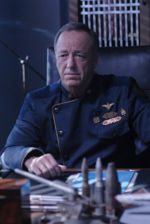
- Daniel Novacek's line, "I felt the institution no longer had anything to offer me..." is an homage to Raising Arizona.
- The right-most decoration pin on the uniform of Admiral Peter Corman is the same type used for Colonial Warriors on the uniforms of the Original Series. This is the second known instance of the pin appearing in the Re-imagined Series, as the first appearance is on then-Commander Adama's dress uniform in the Miniseries.
- The title is a line from the theme song of Cheers.
- At the beginning of the episode, Baltar and Head-Six are humming a rearrangement of a familiar tune with alternate lyrics in Galactica's brig. Baltar "improvises" the well-known line, "Should I die before I wake..."
- The title is the name of a song composed by John Lennon and Paul McCartney and recorded by The Beatles for their album Sgt. Pepper's Lonely Hearts Club Band.
- The Raptor accident is reminiscent of the Gemini 8 incident, where a jammed thruster spun the spacecraft up to dangerous rates. The crew only managed to regain control by using some of the fuel intended for re-entry.
- Baltar's book being referred to simply as "the book" may be a reference to George Orwell's novel Nineteen Eighty-Four, in which Goldstein's The Theory and Practice Of Oligarchical Collectivism is in all cases called "the book" by Goldstein's sympathizers.
- This episode's title is a pun on the title of the 1926 Ernest Hemingway novel The Sun Also Rises.
- Sam Anders' flipping a coin and continually coming up with heads is reminiscent of the early moments of Tom Stoppard's play Rosencrantz And Guildenstern Are Dead, in which Rosencrantz has the same result on a coin flip over a dozen times. This leads Guildenstern to comment "Consider - One: Probability is a factor which operates within natural forces. Two: Probability is not operating as a factor. Three: We are now held within un-, sub-, or supernatural forces." The moral is that two minor characters within a play (namely, Hamlet) have no control over their fate, and are condemned to carry out their role in the story regardless of their desperate attempts to change events.
- Helo's final line in this episode is almost an exact duplicate of the ending of the movie The Terminator, and is very similar to the warning issued by the prophetess in The Stand.
- The music that Galen Tyrol, Samuel Anders, Saul Tigh, and Tory Foster hear is a cover of the Bob Dylan song "All Along the Watchtower". Dylan has said that the song is better understood when the lyrics are read in reverse order.
- The total number of casualties incurred in the Battle of the Ionian Nebula—1,701—is a homage to the Enterprise from the Star Trek series, which shared that registry number (NCC-1701).
- The number on the weapons locker, 1701D, is the registry number to the Enterprise from Star Trek: The Next Generation.
References
- ↑ 1.0 1.1 1.2 Bassom, David (2007). Cath Trechman Battlestar Galactica: The Official Companion Season Three. Titan Books. ISBN 1-84576-478-1, p. 39.
- ↑ Bassom, David (2007). Cath Trechman Battlestar Galactica: The Official Companion Season Three. Titan Books. ISBN 1-84576-478-1, p. 38.
